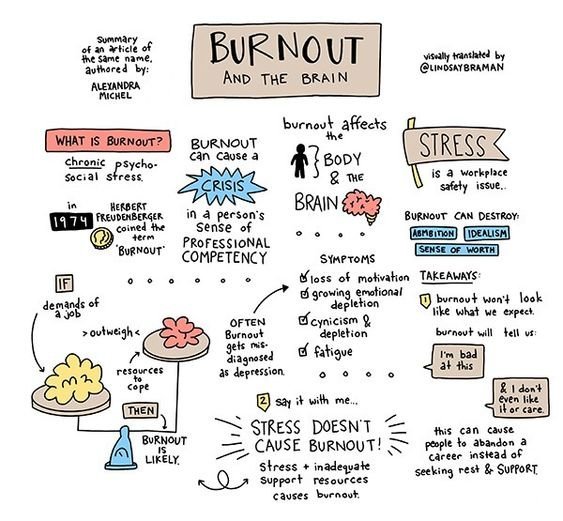Depression vs Burnout
What is Burnout?
In 1974 Herbert Freudenberger coined the term ‘burnout’. Burnout refers to a period of chronic psychosocial stress. Burnout can cause a crisis in a person’s sense of competency. It impacts the body and the brain in such ways as brain fog, heart palpitations, a sense of numbness and disrupted or non-restful sleep. Burnout begins to erode our sense of worth and optimism. Symptoms can include a loss of motivation, growing emotional depletion and fatigue. When burnout presents itself it can often get misdiagnosed as depression as it can echo its presentation.
photo credit @lindsaybraman
How does burnout happen?
Burnout occurs when our resources to cope outweigh the demands of life. Stress does not cause burnout. Stress with the addition of inadequate support resources causes burnout.
What is the difference between burnout and depression?
Burnout and depression may share some similar symptoms, but they are two distinct conditions. Burnout is thought to be caused by chronic stress relating to work or other ongoing activities such as caring for a family member or raising a family. However, burnout is typically work-related. The symptoms of burnout might sound very similar to the symptoms of depression, and they can be, which is why careful precautions should be taken when trying to distinguish burnout from depression. Because the symptoms are similar, some people may be diagnosed with burnout although they have depression. So it's important to not (self-) diagnose burnout too quickly. Doing so could lead to the wrong treatment: For instance, advising someone with depression to take a long vacation or time off work. People who are “only” exhausted because of work can recover if they follow that advice. But if people with depression do so it might make things worse because the kind of help they need is very different, such as psychological treatment or medication.
With burnout, most problems are related to work and adjustments made concerning work will typically help. However, with depression, other important treatments such as therapy or medication may be needed. Depression also has certain symptoms that burnout doesn’t usually exhibit, including:
Low self-esteem
Feelings of hopelessness
Suicidal thoughts
How can I help myself move forward?
If you feel you’re experiencing burnout it can be helpful to review how many or little of your needs are being met. Such as physiological, social and esteem needs. It can be helpful to assess our needs through this questionnaire and each week give yourself one thing to add to your life. This could look as simple as drinking a little more water or going on a 5-minute walk before bed without noise to let your mind wind down for quality sleep. Whatever it might look like, assess the gaps in your care and gently reengage with them over some time. External factors should be considered such as communication surrounding boundaries with your place of work may also be required. In reflection, if you feel like you're experiencing depression as opposed to burnout seek an appointment with your GP to discuss support options via mediation or counselling. Although the road through depression can be a challenging one, depression is very much a treatable condition with the right support and care.


